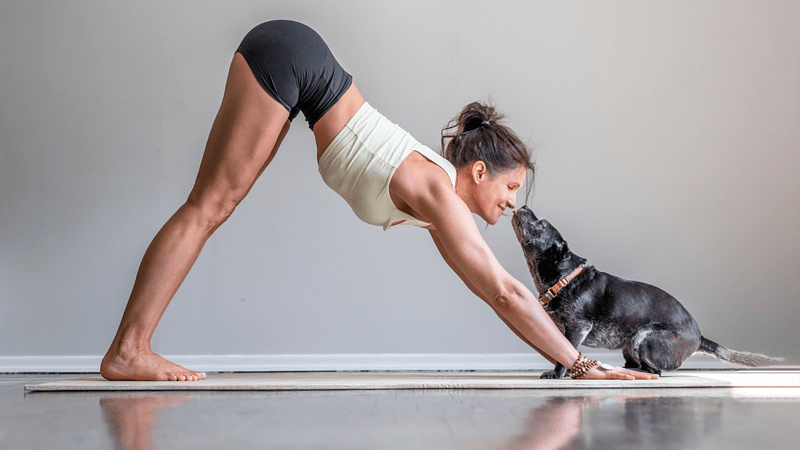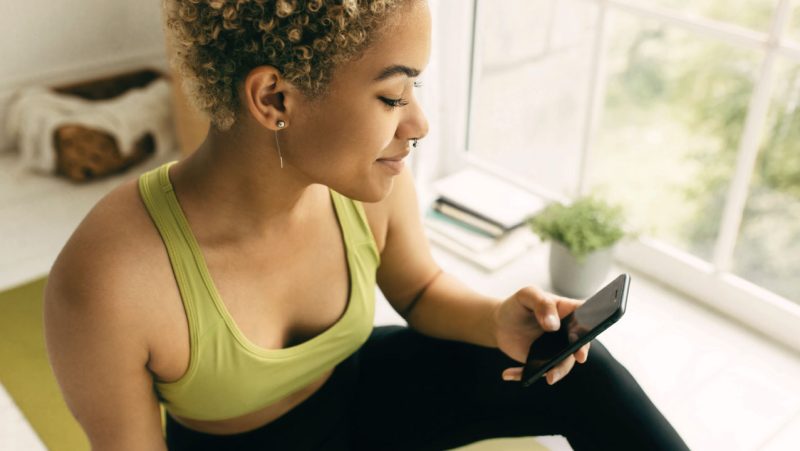
I Changed My Schedule, And It Changed My Life
How Trading Screen Time at Night for an Ayurveda-Recommended Bedtime Led to a Better Everything
Reading time: 8 minutes
We've all heard Benjamin Franklin's quote- " Early to bed and early to rise, makes a man healthy, wealthy, and wise." But how many of us have really applied those principles to life? I hadn't until recently, and I'll share how to adopt an earlier bedtime. The numerous benefits I experienced transformed my life.
In mid-August 2024, I decided to deactivate Instagram and Facebook. It's not that I was overwhelmed or disappointed with what I saw on social media; it was because I dedicated excessive time to Instagram, which caused me to fall behind on my personal project of updating my website. I spent so much time on the app that I was lagging on my to-do list.
I was over two months behind and noticed that whenever I tried to work on my website, I would somehow find myself scrolling on Instagram or looking at updates on Facebook. It made me rush to work in the morning, as I would start later than planned, and at night, even if I were in bed by 11 p.m., I found myself awake until 1:30 a.m.
One evening, a friend told me I would probably be happier without Instagram, which could be true for some people. The world is very polarizing right now, and when it comes to extreme opinions, it is assumed that if you aren't supporting a cause, you are against it. Without social media, I wasn't witnessing the chaos.
I also didn't know what was trending or who had gone viral. My senses weren't overstimulated like before; they appreciated that break. Instead, I spent my mornings and evenings listening to podcasts and audiobooks about health and self-improvement.
So, what does taking a short hiatus from social media have anything to do with my life-transforming? It was the first change that influenced other changes, but first, I have to tell you about my adventure with Ayurveda.
In February 2024, I started the Chopra Ayurvedic Health Teacher Certification because I had felt a little lost over the last few years. I was already doing yoga several times a week, meditating daily to manage my stress, and reading articles on health and wellness. It would also be helpful in my writing.
One of my favorite classes was Ayurvedic daily routines (dinacharya), where we learned that there is a right time to do everything. When we do, it significantly improves our lives because our body has a natural circadian rhythm that works 24 hours a day. Ayurveda recommends the right time to do everything because that is how our mind and body work most efficiently.
I always knew about all the good habits I should adopt. Still, I only cared once I learned how those timely habits influenced my overall well-being. My body always knew, but I had no idea. In my early 40s, I knew I couldn't get away with the same things I did in my 20s and early 30s.
As a newly certified Ayurvedic Health Teacher in July 2024, the first habit I wanted to change was going to bed early. In my class, we learned about the Ayurveda clock and how doing certain things at certain times is most beneficial for the body. Ayurveda is very smart, and in the Ayurveda clock, they divide the 24 hours in a day into six sections: Kapha time (6-10 a.m. and 6-10 p.m.), Pitta time (10 p.m. - 2 a.m. and 10 a.m. - 2 p.m.), and Vata time (2-6 a.m. and 2-6 p.m.).
The energies of the elements Kapha (Earth), Pitta (Fire), and Vata (Air) match our energy during their time. Let me explain how our bodies work differently depending on time.
During Kapha hours, our minds and bodies are slower. Kapha morning (6-10 a.m.) is considered the best time to exercise to wake the body up, and in the evening (6-10 p.m.), Ayurveda recommends you finish work and start winding down for the night. Eating dinner before 6 p.m. is recommended because digestion slows down significantly once the sun has set, which explains why we don't sleep well after eating a late dinner.
During Pitta hours, our minds and bodies are most intense and motivated. So, during Pitta day hours (10 a.m.- 2 p.m.), it is best to do your most challenging work and eat your biggest meal, as digestion is strongest. Sleeping at night before Pitta hours, which starts at 10 p.m., is ideal.
Avoid staying up past 10:30 p.m., as your body needs this time for rest and rejuvenation. Pitta's energy can sometimes disrupt sleep, leading to late-night snacking or a desire to stay awake.
If you've ever woken up around two or three in the morning and been unable to sleep, it is because it is Vata hours (2-6 a.m.) when you have so much energy and your mind is filled with ideas and thoughts. Waking up before 6 a.m. prevents you from feeling tired in the morning compared to waking up during Kapha's morning hours (6-10 a.m.).
Also, during the Vata hours of the day (2-6 p.m.), you are most creative, and it is a wonderful time to make plans and get ideas. It felt like a lot to take in because I was overwhelmed about having to change everything. Plus, changing everything is impossible, so it's best to try to change one habit at a time.
10 p.m. is considered ideal for sleep. It felt too early for me, but staying up late didn't help me in any way, so I gave it a shot. My goal was 10:30 p.m., but I started small. Slowly, I changed my bedtime from midnight to 10:30 p.m. by moving it up 15 minutes every week or two; it took weeks, but I made it.
Next, I started exercising in the morning before 10 a.m.- and I feel much more energetic the days I do. My diet remained consistent, but I shifted my dinner time to 7 p.m. from 9 p.m.- I still crave a snack at my old dinner time, so I drink a glass of warm milk. I had a bad habit of snacking late at night and eating before bed, which can make your body store more fat and make sleep less restful.
Be patient, and it will make sense.
Eating the same thing during the day has a different effect. When I knew better, I tried to do better. Some nights, I give in to ice cream or potato chips before bed; those nights, I don't sleep well and wake up feeling full. I try to be kind to myself; if it happens sometimes, it's okay as long as it doesn't become a habit again.
This is due to the two hunger hormones, ghrelin and leptin. Ghrelin is a hormone produced in the stomach that stimulates appetite. It rises before meals and decreases after eating, with a sharp increase before nightfall.
Leptin is released by fat cells to let you know you are full. It rises after eating but can be ineffective due to leptin resistance if you eat too much, too late, or don't sleep enough. Both hormones follow a circadian rhythm, influencing appetite and fat storage.
Changing that one habit of an early bedtime cascaded a series of changes that I never expected. I noticed that since I stopped using Instagram- I had been choosing an earlier bedtime because there was no temptation to get on it. I was also waking up earlier without feeling groggy or tired like before.
I have a simple bedtime routine that has been helpful to me. I start getting ready for bed around 9:30 p.m. (of course, some nights, things don't go as planned). I brush my teeth, do my nighttime skincare routine, and do 15-20 minutes of yin yoga with a Balsam candle.
Then I massage my feet with lavender oil, and it's lights out by 10:30 p.m.
Many people think Ayurveda is too 'woo-woo', but many of its claims are now backed by science. Lack of sleep slows your metabolism, making it harder to lose weight. By adopting an earlier bedtime, I lost some weight.
Despite maintaining my usual eating and exercise habits, I noticed reduced cravings for sugary snacks, particularly late at night. This newfound energy and control over my appetite allowed me to make healthier choices throughout the day. Additionally, waking up earlier provided me with more time for productivity and helped me establish a natural sleep-wake cycle, improving the quality of my rest.
When people asked me what I was doing differently, and I told them that I was following the Ayurveda clock to do certain things, some asked more questions, and some said to me that the only reason I was able to do that was because I didn't have the same responsibilities as them.
This is true, but everyone has struggles, challenges, and weaknesses. I am doing what I can with the available knowledge and information.
Sleeping on time, I started syncing my body with its natural circadian rhythm, and everything started to make sense and feel easier and better. It was challenging initially because I was used to my old routine, which I had followed for decades.
I am not saying goodbye to social media forever, but I love the new me. It makes me more productive, well-rested, and energetic. However, I want to avoid using social media before bed or first thing in the morning because what I have gained is too precious to lose.
I understand the importance of a good night's sleep because how well you sleep decides how well you do when you are awake. I also want to say that deactivating all social media for some time doesn't automatically mean you will go to bed early because it's different for everyone—perhaps you stay up watching television or socializing. Still, I have never heard anyone say choosing an earlier bedtime is terrible.
I cannot guarantee that a temporary goodbye to social media will make you reach your goal weight, but I can guarantee that choosing an earlier bedtime will make you feel better and happier.
I understand that people who work overnights, are new parents, or have other responsibilities may not be able to schedule a bedtime as easily as others because life happens. The goal is not to make people feel bad when they cannot follow the schedule. You have to do what is possible for you to do.
While the benefits of an earlier bedtime have been significant for me, it's essential to recognize that individual needs and cultural practices may vary. We have to do what we can with our time and try to make the most of it.
So, there you have it.
I made one change by choosing an earlier bedtime, and over time, many little habits I wanted to change slowly started to change without too much resistance. If there is one thing I recommend to everyone, it is to try to go to bed around 10-10:30 p.m. for those who can. Your mind and body will thank you, and you will feel happier and less stressed—and don't we all want that?
In conclusion, adopting an earlier bedtime has had a profound positive impact on my life. By aligning my sleep schedule with my body's natural circadian rhythm, I've experienced improved energy levels, reduced stress, weight loss, and a greater sense of overall well-being.
I feel happier, I am less irritable, and I like myself more. Please consider making this simple change in your routine. Remember, a good night's sleep is the foundation for a healthier, happier, and more productive life, and it's free.





